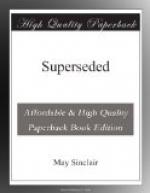The address was printed and a copy was given to each member of the staff. Miss Quincey treasured up hers as a priceless scripture.
Miss Quincey was aware of her shortcomings and had struggled hard to mend them, toiling pantingly after those younger ones who had attained the standard of brilliance and efficiency. She joined the Teachers’ Debating Society. Not that she debated. She had once put some elementary questions in an inaudible voice, and had been requested to speak a little louder, whereupon she sank into her seat and spoke no more. But she heard a great deal. About the emancipation of women; about the women’s labour market; about the doors that were now thrown open to women. She was told that all they wanted was a fair field and no favour. (The speaker, a rosy-cheeked child of one-and-twenty, was quite violent in her repudiation of favour.) And Miss Quincey believed it all, though she understood very little about it.
But it was illumination, a new gospel to her, this doctrine of General Culture; it was the large easy-fitting formula which she had seemed to need. With touching simplicity she determined to follow the course recommended by the Head. Though by the time she had corrected some seventy manuscripts in marble-backed covers, and prepared her lesson for the next day, she had nothing but the fag-end of her brain to give to the healers and regenerators; as for rising, Miss Quincey felt much more like going to bed, and it was as much as she could do to drag her poor little body there. Still Miss Quincey was nothing if not heroic; night after night twelve o’clock would find her painfully trying to draw water from the wells of literature. She had begun upon Browning; set herself to read through the whole of Sordello from beginning to end. It is as easy as a sum in arithmetic if you don’t bother your head too much about the Guelphs and Ghibellines and the metaphors and things, and if you take it in short fits, say three pages every evening. Never any more, or you might go to sleep and forget all about it; never any less, or you would have bad arrears. As there are exactly two hundred and thirteen pages, she calculated that she would finish it in ten weeks and a day. There was no place for Miss Quincey and her pile of marble-backed exercise-books in the dim and dingy first-floor drawing-room (Mrs. Moon and the bandy-legged cabinet would have had something to say to that). All this terrific intellectual travail went on in a dimmer and dingier dining-room beneath it.
Then one night, old Martha, disturbed by sounds that came from Miss Juliana’s bedroom, groped her way fumblingly in and found Miss Juliana sitting up in her sleep and posing the darkness with a problem.
“If,” said Miss Juliana, “three men can finish one hundred and nineteen hogsheads of Browning in eight weeks, how long will it take seven women to finish a thousand and forty-five—forty-five—forty-five, if one woman works twice as hard as eleven men?”




